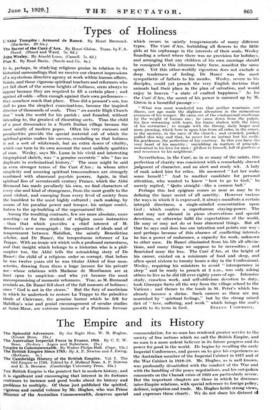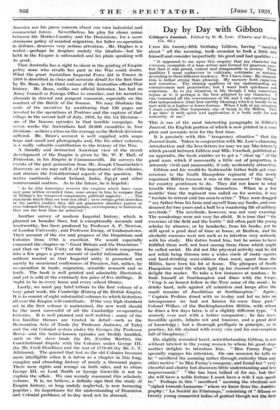The Empire and its History
The Splendid Adventure. By the Right Hon. W. M. Hughes. (Ernest Bean. 21s.)
The Cambridge History of the British Empire. Vol. I. The Old Empire to 1783.. Edited by J. Holland Rose, A. P. Newton and E. A. Benians. (Cambridge University Press: 358.)
- •
THE British Empire is the greatest fact in modern history, and it is: significant and encouraging that interest in its fortunes continues to increase and good hooka about its history and problems to multiply. Of those just published the spirited; vigcirous and candid -voluine by Mr. HUghei, Who was Prime Minister of the Australian Commonwealth, deserves special commendation, for no man has rendered greater service to the society of free nations which we call the British Empire, and no man is a more ardent believer in its future progress and its power for good in the world. He begins by recalling the early Imperial Conferences, and passes on to give his experiences as the Australian member of the Imperial Cabinet in 1917 and of the War Cabinet in 191849; Mr. Hughes, as is well known, was profoundly dissatisfied with the "Conduct of the War and with the lutialling of the peace negotiations, and his outspoken comments on the Chanik crisis of 1922 are particularly Severe.' But the important chapters are -those in which he discusses inter-Empire relations, with special reference to foreign policy; defence-, Migration and trade. Mr. Hughes holds Strong views, and ,expresses them clearly. We do not share his distrust ôl
America nor his grave concern about our own industrial and commercial future. Nevertheless, his plea for closer union between the Mother Country and the Dominions, for a more strenuous policy of assisted migration, for fuller co-operation
in defence, deserves very serious attention. Mr. Hughes is a realist—perhaps he despises unduly the idealists—but his faith in the Empire is unbounded and his plain speaking will do good.
That Australia has a right to share in the guiding of Empire policy none who recalls her part in the War could doubt. What the great Australian Imperial Force did in France in
me is described in clear and accurate detail for the first time by Mr. Bean, in the third volume of the Australian official War history. Mr. Bean, unlace our official historian, has had no Army Council or Foreign Office to consider, and his narrative abounds in shrewd and pungent comment, especially on the conduct of the Battle of the Somme. We may illustrate the scale of the narrative by mentioning that 150 pages are devoted to the operations at Pozieres and the capture of that village in the second half of July, 1916, by the 1st Division—
one of the famous episodes in that terrible campaign. In seven weeks the Australians had 28,000 casualties in four divisions—asheavy a loss on the average asthe British divisions suffered. Mr. Bean's account is well supplied with maps large and small and photographs and, like his other volumes, is a really valuable contribution to the history of the War.
A friendly and instructed American view of the recent development of the Empire is given by Mr. W. P. Hall, of Princeton, in his Empire to Commonwealth. He surveys the events of the past generation from Mr. Joseph Chamberlain's discovery, as one may call it, of the importance of the colonies, and stresses the Constitutional aspects of the question. He writes cautiously about Ireland, India, Egypt and other controversial matters. As to the future, he is hopeful :
"As he (the historian) reviews the empires which have come and gone within recorded time, none seems to him to surpass that of Britain's for tempered compromise, political sagacity. . . . The standards which they set were not ideal ; over certain great stretches of the earth's surface they did not guarantee absolute justice or even tolerant liberty ; but by comparison, contemporary or historical, they are the best thus far achieved.
Another survey of modern Imperial history, which is planned on broader lines, but is exceptionally accurate and trustworthy, has been produced by Professor A. P. Newton, of London University, and Professor Ewing, of Grahamstown. Their account of the rise and progress of the Dominions and Colonies from 1783 is excellent. We would especially commend the chapter on" Great Britain and the Dominions" and that on "The Unity of the Empire," which compresses into a few pages a great amount of useful information. The authors remind us that Imperial unity is promoted not merely by occasional conferences of Premiers, but, rather, by co-operation in trade, migration, scientific research and so forth. The book is well printed and admirably illustrated, and yet is sold at the extremely low price of five shillings. It ought to be in every home and every school library.
Lastly, we must pay brief tribute to the first volume of a very great work, the Cambridge History of the British Empire. It is to consist of eight substantial volumes to which historians
all over the Empire will contribute. If the very high standard set in the first volume is maintained, the new work should be the most successful of all the Cambridge co-operative histories. It is well planned and well written ; many of the
less familiar themes are treated in detail—such as the
Restoration Acts of Trade (by Professor Andrews, of Yale) and the old Colonial system under the Georges (by Professor Rees)—and the better-known episodes are freshly handled, such as the slave trade (by Dr. Eveline Martin),, the Constitutional dispute with the Colonies under George III. (by Mr. Cecil Headlam) and the war of 1776-83 (by Mr. C. T. Atkinson). The quarrel that lost us the old Colonies becomes more intelligible when it is taken as a chapter in this long, complex and absorbing history of nearly a thousand pages. There were rights and wrongs on both sides, and to abuse George III. or Lord North or George Grenville is not to explain the affair. We can warmly commend this scholarly volume. It is, we believe, a definite sign that the study of
Empire history, so long unduly neglected, is now becoming popular ; its importance for the understanding of Dominion and Colonial problems of to-day need. not be stressed.











































 Previous page
Previous page